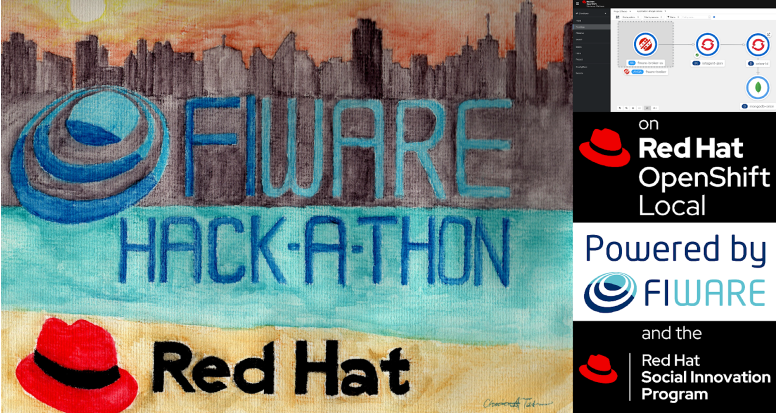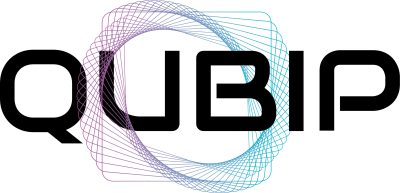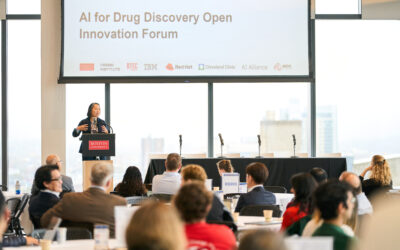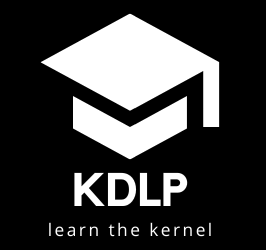By Chris Tate, Principal Software Engineer, Red Hat
Christopher Tate is a lead software engineer for logging, metrics, alerts, and AI/ML smart data research projects in the New England Research Cloud (NERC) environment. He is also the creator of the Smart Village Operator and Smart Village Platform on Red Hat OpenShift for the Smart Village project in progress at the Red Hat Collaboratory at Boston University.
Software can help build a better world, but finding a place to get started can be challenging. Joining a hackathon means you don’t have to wait for the right software to come along. Instead, you can work with domain experts to build solutions together. Working with Red Hat’s Global Social Innovation Program and different communities across Red Hat, such as Red Hat Impact and Blacks United in Leadership and Diversity (B.U.I.L.D.), I’ve participated in multiple hackathons that solved unsolved global problems, launched new open data websites, built new containers for medical imaging, and more.
In my role as founder of the Smarta Byar Smart Village FIWARE iHub, I’ve planned my next hackathon with Red Hat Impact and students from historically black colleges and universities (HBCUs) in North Carolina, including Shaw University, St. Augustine’s University, and North Carolina Central University. They will each develop a new Python microservice in an individual Red Hat OpenShift Developer Sandbox, including their own Red Hat OpenShift AI Workbench. The new microservice will connect to the live Smart Village project API and query traffic data over time. Participants will also update a Smart Traffic Light API in their own sandbox. Event-driven updates via WebSockets will update their Smart Traffic Light map and dashboard in real time, enabling a real edge-to-cloud solution for Red Hat Research. Other Red Hat groups are participating in HBCU hackathons organized by Kimla Lee, Preethi Thomas, Joseph Marrero Corchado, Sherard Griffin, and Wajeha Barakat.
Why hackathons? They build community, create teaching and learning opportunities, and, most importantly, bring about working solutions. Here are several examples demonstrating how hackathons have leveraged experts worldwide and developers of all experience levels to solve common problems and continue to make an open source difference. I’ve also provided several links to the relevant projects, repositories and future opportunities!
Applying open source to remote mobility problems
The 2018 Social Innovation Hackathon brought Red Hat consultants together to tackle challenges that can be solved with open source contributions to GitHub. We collaborated with UNICEF Innovation, which applies technology to the world’s most pressing problems facing children. In a video about the collaboration, Red Hatter Alexandra Machado explained the genesis of the project: “How can we leverage what Red Hat does to help the world? We started a social innovation initiative to go out there and find some project that we feel very passionate about, where we help some social cause.”
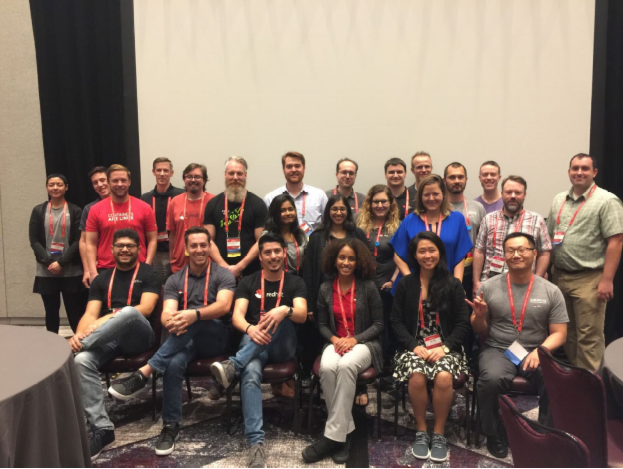
With support from Red Hat, UNICEF built a sandbox where universities, researchers, and data scientists can work together to analyze data gathered by Project Connect. Project Connect maps the real-time connectivity in every school in the world, with the aim of getting every school connected to the internet. One of the challenges solved during the hackathon was multi-hop mobility using a single database query. In the context of UNICEF and the mobility of schools at risk, multi-hop is a large-scale overview of how people are moving by calculating anonymized, aggregated data of trips between specific points (i.e., cellphone towers) over the course of a day.
Driving social change through collaboration and open data
At the end of May 2020, in the midst of worldwide protests in reaction to the murder of George Floyd, Red Hat made a statement of solidarity with the Black community. As part of that, Red Hat’s B.U.I.L.D. community selected the Southern Coalition for Social Justice (SCSJ) to receive a donation to help further its mission. In addition to the donation, we engaged with SCSJ through our Social Innovation Program to create a Racial Equity Report Cards platform (RERC).

During a hackathon on Martin Luther King Jr. Day 2021 and throughout the year, participants completed development of two open source web-based technologies for SCSJ. The launch of the RERC platform makes it easier for SCSJ to enter data through an online form and generate up-to-date report cards instantly, using an API deployed on Red Hat OpenShift. “This solution allows us to focus more on supporting grassroots campaigns addressing these issues and provides these communities with a user-friendly platform to identify racial disparities that need to be addressed,” said SCSJ’s Tyler Whittenberg. SCSJ also launched an Open Data Policing platform on Red Hat OpenShift Online. “It provides community organizers and policymakers with information they can use to help inform their own policies about police departments,” said Whittenberg.
Solving worldwide pandemic problems together through technology
Red Hatters around the globe connected in October 2021 for an event called the Red Hat Inspire Hackathon. We partnered with three nonprofit open source projects fighting the pandemic through open science and open education. Over 120 total Red Hat contributors across three regions submitted over 150 commits!
- ChRIS : ChRIS is an open source framework that democratizes medical analytics application development using the open cloud so health organizations can continue to own their data while benefiting from public cloud processing capabilities. For this project based at the Red Hat Collaboratory at Boston University, contributors wrote code to automate the deployment of the entire ChRIS platform to Podman using Ansible for the first time and containerize the Linux application.
- Curriki: Curriki is an open education platform that brings online education to underprivileged communities. Participants in the Curriki hackathon assisted in MSA design, Quarkus efficient services, automation in Tekton or Jenkins, and observable components using Prometheus and Grafana.
- Serratus: Serratus is an open science discovery platform uncovering and understanding the world’s viruses, undertaking a comprehensive reanalysis of 10,000,000+ gigabytes of data to catalog every virus on Earth. Participants in the Serratus hackathon generated rich and comprehensive data to accelerate the global research efforts in fighting SARS-CoV-2 and other emerging viral diseases.
Containerizing medical analytics applications for open compute
The Red Hat Social Innovation Program created Red Hat Impact to help Red Hatters contribute their skills to socially and environmentally impactful open source projects helping to solve the world’s most pressing problems. We launched a Red Hat Impact Day of Learning Hackathon in September 2022 to help the ChRIS Project again, this time to containerize open source medical analytics applications for open computing cloud services.
The goal of this hackathon was to make additional open source applications available for ChRIS. The Boston Children’s Hospital ChRIS team identified a list of helpful plugins for the ChRIS ecosystem, non-technical and technical contributors collaborated to document and develop new ChRIS plugins as container images.
The results of the Red Hat Impact Day of Learning Hackathon were impressive. Here are highlights by the numbers:
- Over half a million lines of code added in one weekend
- 26 brand new ChRIS Project Plugin repos created
- 78 total issues, 28 issues closed by 14 teams
- 19 new ChRIS Project Plugins documented with READMEs
- 190 total commits
- 30 total authors of commits
- 40 pull requests merged
The Boston Children’s hospital team reviewed all contributions and selected winners based on impact after testing the new containers with actual brain scan data. The onboarding steps, kickoff video, and wrap-up video on are available on Youtube.
FIWARE Smart Data Model Hackathon for Edge
In February 2023, we hosted a Red Hat Impact Hackathon in partnership with FIWARE. FIWARE is a non-profit organization headquartered in Berlin with a mission to build an open, sustainable ecosystem around public, royalty-free, and implementation-driven software platform standards for developing smart solutions in multiple sectors, following a digital twin approach. Red Hat consultants met in person after several years of coming together virtually for hackathons. Participants used their technical and non-technical skills to contribute in teams of four to socially impactful Smart Data Models. (Learn more about FIWARE Smart Data Models in the article “Building better communities with streaming data and machine learning using FIWARE.”)
You can practice deploying FIWARE Smart Data Models on your own OpenShift Local environment by following our FIWARE hackathon onboarding videos.
Building on the work we are continuing with FIWARE, teams ran OpenShift Local on their laptops, deploying FIWARE applications into OpenShift, importing Smart Data Model data, and visualizing the data creatively. Because our work is always open source, you can practice deploying FIWARE Smart Data Models on your own OpenShift Local environment by following our FIWARE hackathon onboarding videos.
The creation of the whole hackathon was automated with this Ansible playbook and Ansible roles for organizing a FIWARE Hackathon. This allows us to add additional context for each role and task easily and update all the issues with a consistent look and feel that is specific to each hackathon. This automation can also power us to launch future hackathons as a FIWARE iHub. We want to continue to share with others how FIWARE open standards and open APIs around smart solutions are making a massive impact worldwide.
Future hackathons
All these achievements help explain why I’m looking forward to the 2024 Red Hat Impact Hackathon: “Visualizing live traffic data from the edge to the cloud.” An added benefit of working with HBCUs in this hackathon is the opportunity to grow the open source talent pipeline as students gain practical experience with the concepts learned in the classroom.
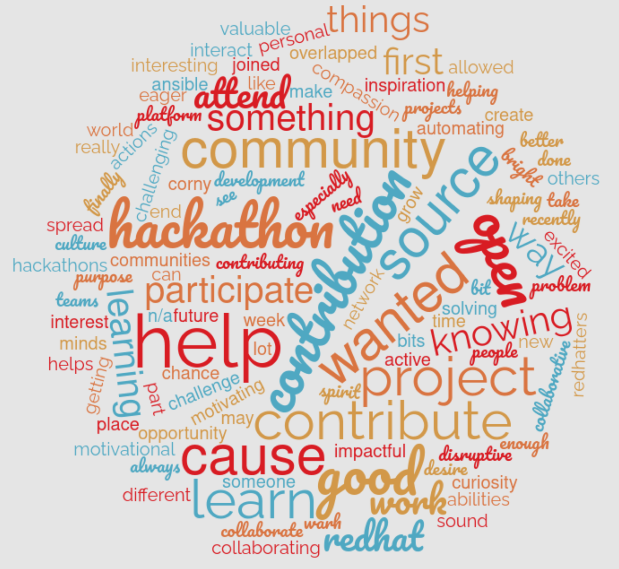
This word cloud, generated from the direct feedback we received from the Red Hat Inspire Hackathon in 2021, gives you a sense of how participants feel after attending a hackathon. Participants learn lasting skills that make them confident in enterprise open source architecture. They learn best practices for contributing to open source software. They build working solutions with emerging Red Hat technologies. Experienced and inexperienced developers teach and learn from each other while building creative solutions, and they can develop their skills further through Red Hat Training courses.
For more information about upcoming social innovation hackathons, previous hackathons, and other helpful details about planning hackathons, please see my website’s hackathon page.
